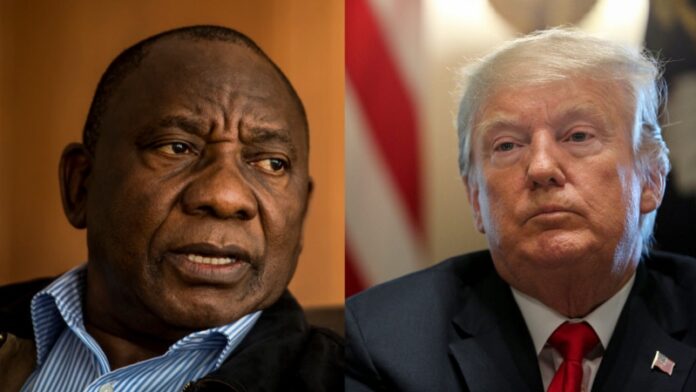US President Donald Trump has threatened to discontinue all future funding to South Africa over allegations of seizing land and “treating certain classes of people very badly”.
Taking to his social media platform on Sunday (yesterday), Truth Social, the president wrote: “South Africa is confiscating land and treating certain classes of people VERY BADLY.
“It is a bad situation that the Radical Left Media doesn’t want to so much as mention. A massive Human Rights VIOLATION, at a minimum, is happening for all to see.
“I will be cutting off all future funding to South Africa until a full investigation of this situation has been completed!”
Speaking later in a briefing with journalists, Trump accused the South African authorities of “doing some terrible things, horrible things”.
“So that’s under investigation right now. We’ll make a determination, and until such time as we find out what South Africa is doing — they’re taking away land and confiscating land, and actually they’re doing things that are perhaps far worse than that.”
The US president is believed to be defending White South Africans, some of whom have alleged that the South African policy is unfair to them.
Recall that the president of South Africa, Mr Cyril Ramaphosa had in January 2025 signed into law a bill that would make it easier for the state to expropriate land in the public interest.
The law aims to address racial disparities in land ownership that persist three decades after apartheid’s demise in 1994.
Last month, Ramaphosa also said he was not worried about the country’s relationship with Trump. He said he had spoken to Trump after the latter’s election victory and looked forward to working with his administration.
South Africa’s foreign ministry said in response to Trump’s post that “we trust President Trump’s advisers will make use of the investigative period to attain a thorough understanding of South Africa’s policies within the framework of a constitutional democracy.
“This approach will promote a well-informed viewpoint that values and recognises our nation’s dedication to democratic ideals and governance. It may become clear that our expropriation act is not exceptional, as many countries have similar legislation.”
It added: “Such insights will ensure a respectful and informed approach to our democratic commitments. It may become clear that our expropriation act is not exceptional, as many countries have similar legislation.”
In South Africa, one of the legacies of the apartheid system is a profound inequality in land ownership.
White South Africans comprise less than 10 per cent of the country’s population but own about 72 per cent of its agricultural land.
The 1913 Native Lands Act made it illegal for Africans to acquire land outside the reserves, known as “homelands”.
Since the end of apartheid in 1994, the country has been making efforts to address historical disparities.
However, the government’s efforts to speed up the process through an expropriation without compensation policy have been highly controversial, sparking backlash from conservative figures.
During his first administration, Trump said the US would investigate unproven large-scale killings of white farmers in South Africa and violent takeovers of land.
Pretoria at the time said Trump was misinformed. It is unclear whether the Trump administration carried out an investigation.
Among the critics of land reforms in the former apartheid enclave is Elon Musk, a billionaire entrepreneur born in South Africa, who has close ties with the US president.
In 2023, Musk replied on X to a video of a far-left South African political party singing an old anti-apartheid song, “Kill the Boer (farmer)”, by stating: “They are openly pushing for genocide of white people in South Africa.”
“@CyrilRamaphosa, why do you say nothing?” Musk asked.
With agency reports
























































